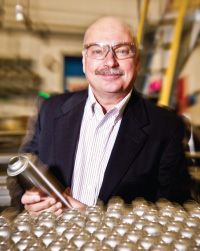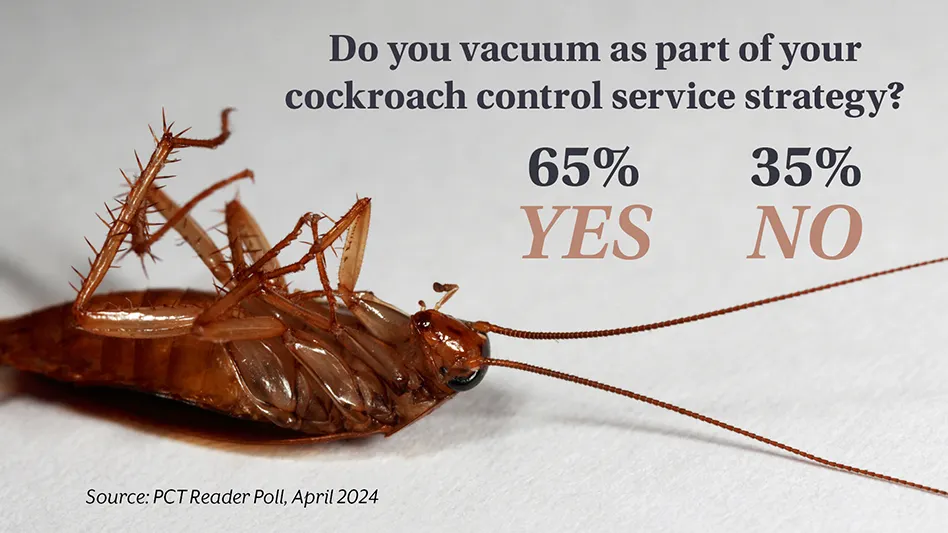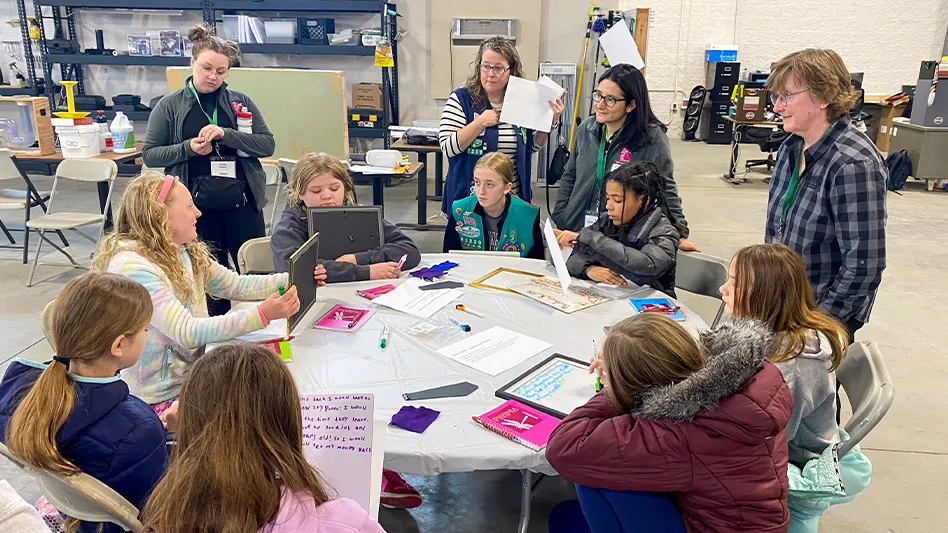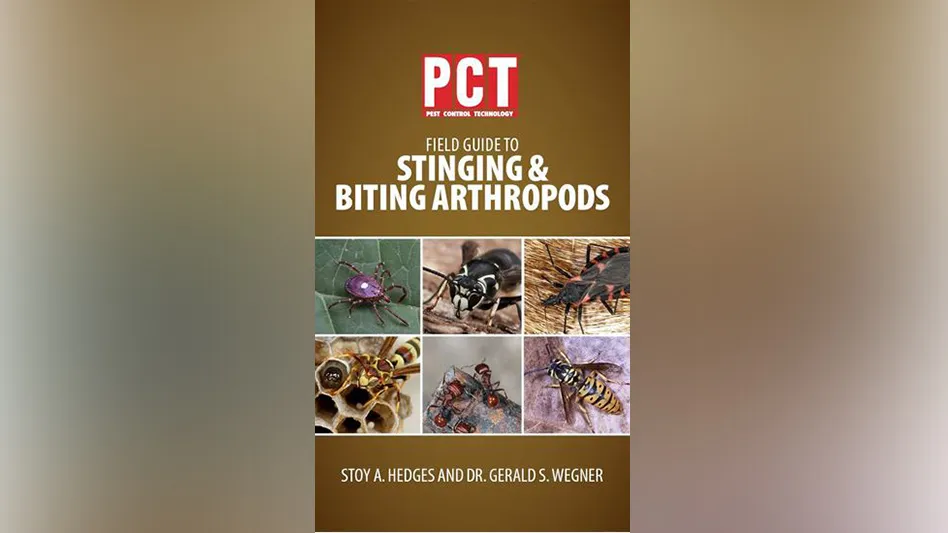 Dan Carrothers, who grew up playing hockey on a family farm in rural Ontario, likes to quote Wayne Gretzky, who once famously said, "I skate to where the puck is going to be, not where it has been." That's sound advice whether you're "The Great One" competing in the Stanley Cup finals or a local PMP going head-to-head with Orkin or Terminix. In both cases, success is based on positioning oneself for a competitive advantage in a fast-paced, rapidly changing environment.
Dan Carrothers, who grew up playing hockey on a family farm in rural Ontario, likes to quote Wayne Gretzky, who once famously said, "I skate to where the puck is going to be, not where it has been." That's sound advice whether you're "The Great One" competing in the Stanley Cup finals or a local PMP going head-to-head with Orkin or Terminix. In both cases, success is based on positioning oneself for a competitive advantage in a fast-paced, rapidly changing environment.
"I've always found a lot of parallels between hockey and business and not just because I'm a Canadian," Carrothers observed. "If you want to succeed in business, you need to be able to assess not only your current situation, but position yourself for success when the business climate changes down the road."
Of course, that's often easier said than done as Carrothers may soon discover after being named business unit manager of BASF Pest Control Solutions earlier this year. The company, like the pest management industry, faces a number of formidable challenges in the months ahead, including a slowing economy, continued softness in the housing market and ongoing litigation relating to the fipronil patent infringement lawsuit that is currently winding through the courts. But Carrothers is confident both he and his colleagues at BASF – as well as the pest management industry as a whole – are up to the challenge.
"They say hockey is a series of 10-foot races; that what determines the ultimate winner of a game is not necessarily a spectacular play by an all-star, but who wins the majority of those 10-foot races. The same is true in our business," Carrothers observed. "From time to time a manufacturer may have an active ingredient or something else that revolutionizes the industry, but the people who are taking our products to market and being successful from a small business perspective are beating their competitors in those series of 10-foot races. It may not be glamorous, but it's effective."
| IN BRIEF Name: Dan Carrothers Title: Business Unit Manager, BASF Pest Control Solutions Location: St. Louis, Mo. Career Highlights: Business Unit Manager, BASF Pest Control Solutions; COO, Datacore Marketing; Managing Director, Chipco Professional Products, Bayer Environmental Science; Field Sales Representative, Monsanto; MBA, Queens University, Kingston, Ontario; Bachelor’s Degree, University of Guelph, Guelph, Ontario. Personal: Grew up on a family farm in Ottawa, Ontario; 53 years old; married 28 years to wife Kim; two children – Ryan, 24, and Lindsay, 26 (son-in-law, Jacob); granddaughter Lily, 13 months old; enjoys hockey, boating, reading and spending time outdoors. |
It's a lesson Carrothers learned early in his career. Since entering the pest control industry in 2000 as director of sales and marketing for Bayer Garden & Professional Care, Carrothers clearly has won more 10-foot races than he's lost, steadily rising through the ranks of the Bayer organization before accepting a position as COO of Datacore Marketing, a data management and strategic marketing firm based in Westwood, Kan., that boasts such high-profile clients as H&R Block, Michelin, Hill's Pet Nutrition and CIBA Vision.
"I had worked with Jeff Yowell, the founder and CEO of the company, for many years while I was at Bayer, and his business had grown very rapidly during that time, so it was a good opportunity," he said. It also enabled Carrothers to reunite with his family, which had stayed in the Kansas City area while his children attended high school, commuting back and forth from New Jersey on a monthly basis.
As chief operating officer of a multi-million dollar enterprise, Carrothers said he learned a great deal not only about himself, but how Fortune 500 companies maximize their return on investment, particularly from a marketing perspective. "There are a lot of insights that I picked up from different industries that I hope to apply to our business," he said, which is why he was tapped for the high-profile position at BASF.
In announcing Carrothers' appointment earlier this year, Jan Buberl, director, BASF Specialty Products, said, "The combination of Dan's experience and business acumen makes him a natural fit for Pest Control Solutions. His leadership skill set will further accelerate our planned growth in the termiticide, general insect and rural hygiene business."
PCT magazine interviewed Carrothers at the UPF&DA Spring Conference to learn more about his plans for BASF's Pest Control Solutions business, as well as his desire to make the company's St. Louis operation a "Center of Pest Control Excellence." Excerpts from that interview follow, along with other news of interest from BASF.
Q. After many years working in the specialty chemicals industry, you joined Datacore Marketing, a strategic marketing firm specializing in data management, as its COO. What did you learn about yourself serving as a chief operating officer of a company?
A. I think the biggest thing I learned is execution is critical. As executives, we put a lot of time and effort into developing very elaborate growth strategies, and I think we do a very good job of laying out those strategies, but most companies don't know how to fully execute their strategic vision. As COO of a business that worked closely with a lot of Fortune 500 companies I saw over and over again where failed execution sub-optimized a great strategy. As a result of that experience, I think it's very important when we think about whatever programs we're going to launch at BASF, we think as much about how we're going to execute those programs as we do in developing them in the first place. The other thing I would say is that as COO of a marketing services company, you have a greater appreciation for what's involved in managing the entire P&L, everything from salaries to employee health care costs. As a result, I think very differently about the challenges of running a small business today than I did earlier in my career.
|
Termidor DRY Receives State Registration in New York Termidor DRY Termiticide from BASF Pest Control Solutions is now registered in the state of New York. The product provides a new method of treating drywood and subterranean termites, in virtually any wood, almost anywhere, the firm says. Key features include:
"The Termidor DRY formulation, applicator, method and uses create significant opportunities for the industry," said Nick Tresslar, marketing manager, BASF Pest Control Solutions. "Termidor DRY can be used in nearly any wood, almost anywhere, offering pest management professionals (PMPs) another option for termite control and opportunities to expand their termite business." To purchase and apply Termidor DRY, BASF requires each pest control company to become a Termidor partner through an online training program. For more information, visit the "Become a BASF Partner" section of www.pestcontrol.basf.us or contact BASF Sales Specialist Tom Dolan at 908/238-9629 or tom.dolan@basf.com. |
Q. Was there any concern on your part that with so much uncertainty surrounding the post-patent future of fipronil that joining BASF as its pest control business unit manager might be more trouble than it's worth?
A. I think that's a great question. There's no doubt Termidor has staked out a brand presence that is almost unparalleled in this industry, and that the product has delivered on its promise over and over again. In a previous life I had to compete against Termidor, so I have a great deal of respect for the chemistry and for what the organization has done to position and market the product, but I also believe that a company is more than just its products. Products come and go. Products sometimes get better over time because of formulation enhancements, packaging changes or the introduction of innovative new delivery systems, so from that perspective I didn't really worry about the future of fipronil. Now, I'm pragmatic enough to know there will be challenges ahead of us, but they're not insurmountable and they weren't enough to make me second guess the opportunity of being a part of the BASF organization.
Q. In assessing BASF's current product portfolio, how do you see it changing over time?
A. First, let's examine some the big drivers for PMPs today. Like most business people, labor is huge so I think moving forward we're going to have to think in terms of how any product innovations are going to save on labor or productivity costs. We've got some innovations that are right around the corner that have the capacity to reduce a PMP's labor expenses by 30 to 80 percent. We're going to be highlighting those innovations at NPMA PestWorld in October. I also think our product development efforts need to be sustainable. It's not so much about making sure a new active ingredient is in the pipeline every few years, but instead making sure that everything we currently have on the market is constantly being enhanced in ways that will allow the PMP to be successful. We can't stop innovating.
Q. What role does the PMP play in that conversation? Is there a mindset among some in the industry that manufacturers should be developing new active ingredients every few years? After all, PMPs have been conditioned to anticipate the introduction of new a.i.'s on a regular basis. Does the new economic reality confronting manufacturers also require a change in thinking at the end user level?
A. I think the word "partnership" gets overused sometimes, but I do think there is an expectation that we're going to partner with PMPs to figure out ways to solve pest problems in ways that over time are more productive, more efficacious and with less of an environmental footprint. I don't know whether they're expecting us to bring new a.i.'s to market every few years, but I do think they're expecting us to look at innovative ways to enhance our existing technology. If you look at some of the leading PMPs today and look at the things they're doing, it's just remarkable. And in many cases they're using technology that is not brand new, but they're deploying it in different ways, and applying it in enhanced delivery systems and formulations. I think necessity is the mother of invention and I think we're seeing that in spades today.
Q. Do you sense the marketplace is more willing to try something new now than they have in the past because the pace of change has accelerated so dramatically?
A. I think anytime someone tells you they like change, what they really mean is they like it when it involves someone else. I think change can be difficult, but the rate of change around us is moving at a pace we've never seen before. Look what's happened to the housing industry the last three to five years, for example. None of us could have predicted the scale at which that entire industry changed. It immediately changed the economics of the business for virtually everybody that's involved in that industry, including PMPs. I doubt people liked that change, but many of them have adapted their business models, identifying new ways to be successful despite the downturn.
Q. One of the big changes that occurred at BASF in recent years was the acquisition of Whitmire Micro-Gen in 2009. Do you have any thoughts about the merger?
A. I think the Whitmire acquisition was really healthy for both companies. Whitmire, in my opinion, represented the industry's entrepreneurial spirit. From a formulation and delivery system perspective, they could do things with products that very few others could, and they did it in a way that PMPs really enjoyed and admired. BASF, on the other hand, is a Fortune 500 company that is extremely innovative, yet also brings a certain amount of discipline to the business. When BASF purchased Whitmire it wasn't so they could make Whitmire look like BASF. I think the real sweet spot here is to balance the entrepreneurial spirit of Whitmire with the Fortune 500 discipline of BASF.
Q. Does maintaining that balance require you have a 24/7 presence in St. Louis?
A. You know, St. Louis is a really unique site. In fact, within BASF it's been tagged as the pest control "center of excellence." What makes it unique is that in a single location we have manufacturing and production capability, R&D, registration, and sales and marketing. You've got all the disciplines dedicated to the pest control industry in a single location. If you're going to call something a center of excellence it really does make sense to have all those disciplines in one location. It means we can sit around a table and talk about product needs and industry issues from a 360-degree perspective. I think that's a true competitive advantage.
Q. You've been through a number of transitions during your career. Have all the mergers and acquisitions that have occurred among manufacturers been good or bad for the industry?
A. I think if you look at the companies that exist today, they are the sum total of dozens of acquisitions over many years, but I also think people remain very proud of their roots. For instance, we had people from AgrEvo, Rhone-Poulenc, Aventis and a number of other companies during my time at Bayer, but I think people remained very proud of their past even though they were part of a new organization. And if you think about BASF's culture today, in addition to being an innovative, science-based organization, it's also a collection of companies that have been acquired from all over the globe. In such cases, I think a culture starts to develop that is built around an acquisitions mindset, that we're the best of the best and therefore uniquely positioned to serve this marketplace.
|
Herrmann Joins BASF as General Insect Control Product Manager
Herrmann comes to BASF from Novus International, where he worked as an e-marketing manager. Prior to that, he held marketing positions at Creative Producers Group, Monsanto and Presto-X Company. Herrmann earned a bachelor's degree in marketing from Southeast Missouri State University. |
Q. Since you've had this breadth of industry experience, what is it that you know now that you wish you knew when you were starting out in the business?
A. First, I'm not sure when I first started out whether I truly understood how our products fit into our customers' businesses. I certainly understood how the products solved problems, but I'm not sure I understood how those products fit into the business from a P&L perspective. Second, I've learned that marketing is a little bit like politics. They say all politics are local and I think that applies to marketing as well. One of the things I have a better appreciation for today than I did some years ago is that it's critical to have a one-to-one relationship with the end user. If you can't tailor your message to that customer in a way that is both relevant and timely, and deliver it in a manner they want it to be delivered, I think it's just noise. Third, I used to think CRM meant "customer relationship management"; now I know it means customers really manage. I wish I could take credit for that observation, but I can't. A gentleman by the name of David Sable, COO of Wonderman, the world's largest direct marketing agency, said it. What it means is you're going to have to work with them (the customer) and not the other way around.
Q. You've been immersed in BASF's pest control business for seven months now, enough time to formulate some specific goals for the organization. What are they?
A. The goals that BASF Pest Control Solutions has set for itself fall into four areas. First, we're going to strive to bring innovations to market that will take 30 to 80 percent of the PMP's labor costs out of the business. Second, we're going to reduce callbacks 15 to 20 percent through innovations in our general insect control product line. Third, we've made a commitment to bring one or two new products to market every year. And fourth, we're going to continue to support the industry through organizations like NPMA and PPMA. Those are the four pillars of our business moving forward and we're expressing them publicly so as to hold ourselves accountable.
Q. When it's all said and done, what do you hope to accomplish during your tenure at BASF?
A. I think people are looking for leadership. I was kind of reflecting on that the other day, just how incredibly depressed and lost so many people are. They're not sure about their careers or jobs. Their house that they believed was going to be the most important investment of their life, is worth far less than today than just a few years ago. When they look at our country and the squabbling over our debt, I think they're frustrated. I sense there's a real longing for some leadership. So, from my little part of the world, one of the things I really would like to see BASF Pest Control Solutions do is to be that leader that stakes out some bold, strategic objectives about where we want to go as an industry. I feel like it's time for us to take that leadership position and be willing to stand up in front of the industry and talk about what we're going to do specifically to achieve those goals. I don't see it as a self-promotional type of thing because, quite frankly, there's no guarantee we're going to achieve everything we set out to achieve. But it's my hope that PMPs recognize there are companies out there like BASF that are willing to put some stakes in the ground and put their financial resources behind achieving some significant, long-term objectives, because, at the end of the day, if we achieve them a rising tide will lift all boats.
More Q&A Online
To read additional excerpts from PCT magazine’s Executive Forum interview with Dan Carrothers at the UPF&DA Spring Conference click here.

Explore the September 2011 Issue
Check out more from this issue and find you next story to read.
Latest from Pest Control Technology
- Gaining Control of Structure-Infesting Carpenter Ants
- Big Blue Bug’s Brian Goldman Receives Rhode Island Small Business Person of the Year Award
- UF Researchers Examine How Much Bait it Takes to Eliminate a Subterranean Termite Colony
- Women in Pest Control Group Continues to Grow, Provide Opportunities in the Industry
- NPMA Announces Results of 2024-2025 Board of Directors Election
- Massey Services Acquires Orange Environmental Services
- Hawx Pest Control Wins Bronze Stevie Award for Sustainability
- Abell Pest Control Highlights Growing Tick Activity Across Canada
 BASF Pest Control Solutions recently welcomed James Herr-mann as product manager for General Insect Control. In his new role, Herrmann will promote and develop new pest control products, as well as support the company's current products. "James' experience developing innovative marketing strategies and driving product awareness will help us continue to meet and exceed the needs of our customers," said Nick Tresslar, marketing manager for BASF Pest Control Solutions. "We are thrilled to welcome him to the team."
BASF Pest Control Solutions recently welcomed James Herr-mann as product manager for General Insect Control. In his new role, Herrmann will promote and develop new pest control products, as well as support the company's current products. "James' experience developing innovative marketing strategies and driving product awareness will help us continue to meet and exceed the needs of our customers," said Nick Tresslar, marketing manager for BASF Pest Control Solutions. "We are thrilled to welcome him to the team."




